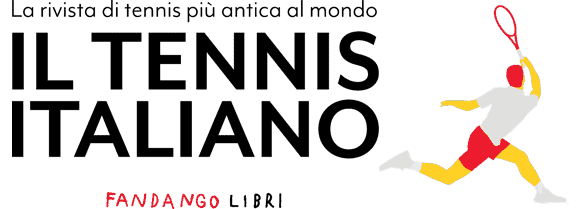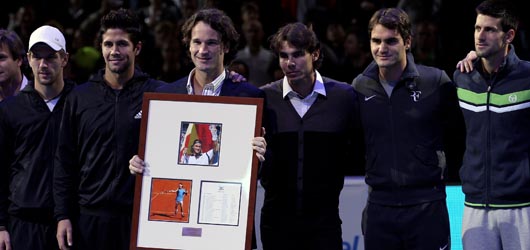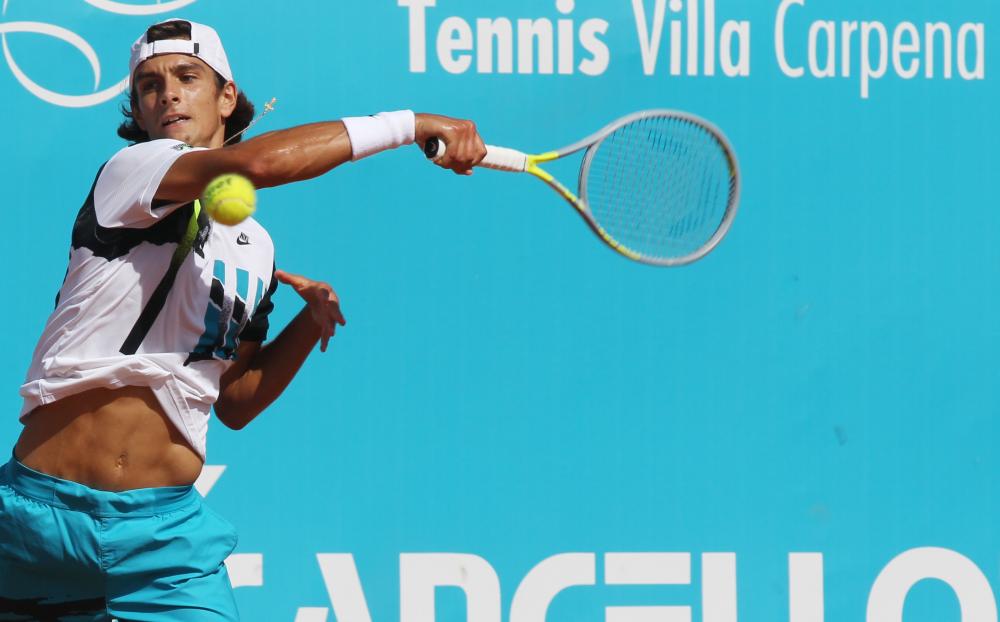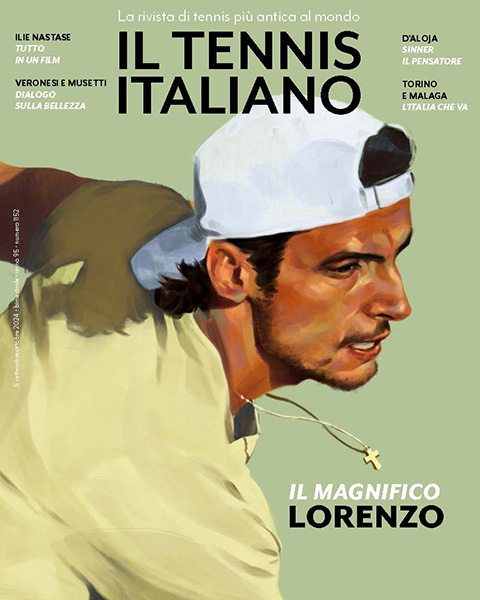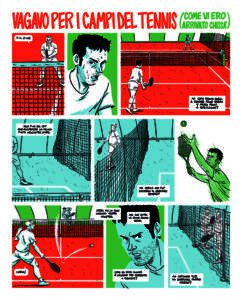da Londra, Giorgio Spalluto – foto Getty Images
Non solo Murray e Soderling. Sul Greenset della 02 Arena, ha fatto il suo esordio sulle note della celebre canzone di David Bowie “Heroes”, anche un tennista che ha da poco deciso di appendere la racchetta al chiodo, e che ha voluto regalarsi un addio in grande stile. C’erano tutti accanto a Carlos Moya (i magnifici 8 più le riserve e il “vecchio” Corretja), per un evento che ha ricordato da vicino il commiato (ben più sorprendente) di Elena Dementieva, qualche settimana fa a Doha. Al posto di Vera Zvonareva, un commosso Rafael Nadal che ha preso la parola per primo, spiccicando qualche parolina d’inglese di circostanza, prima di rivolgersi al suo co-isolano nella lingua madre. “Abbiamo perso un grande ambasciatore per il tennis” ha detto Rafa che ha ricordato il ruolo preponderante di Carlos nel salto di qualità della scuola iberica in termini di completezza tecnica. Poi è toccato a Moya salutare il pubblico londinese che tanto lo ha amato, ma che non ha mai potuto apprezzarlo al meglio delle sue qualità, non essendo l’erba la sua superficie preferita. “Mi ricorderete comunque positivamente perchè sono stato l’ultimo giocatore a essere stato battuto da Tim Henman a Wimbledon (13-11 al quinto nel 2007, ndr)” ha scherzato Moya che poi ha salutato tutti con il famoso “Hasta luego Lucas”, reso celebre dallo stesso Carlos durante la premiazione dell’Australian Open 1997, con cui volle omaggiare il comico Chiquito de la Calzada.
A fare scalpore sono state alcune dichiarazioni rilasciate nella conferenza stampa successiva: “Non ho dovuto insegnare niente a Rafa. Quando aveva 13, 14 anni, e io ero un Top10, spesso ci siamo allenati insieme e qualche volta lui mi batteva. Tutto ciò mi ha costretto a migliorare sempre di più per evitare certe sconfitte. Per questo posso dire che lui mi ha aiutato. Lui non mi deve nulla. Si merita tutto quello che sta vincendo. E naturalmente, oltre a essere bravo, è anche una grande persona.”
[$EmbedVideoYouTube ID:=”8DCzaLtIXFo”; $]
L’intervista in inglese:
THE MODERATOR: Questions for Carlos.
Q. Given the fact that your success was not in England for obvious reasons that you referred to, were you a little surprised about coming out there in front of 17,000 people and having this reception?
CARLOS MOYA: It probably had something to do that it was more the playing five minutes before, so… (smiling).
But still it’s been great. Although I didn’t play great here at Wimbledon, well, I one year played fourth round, they treat me very well always.
They knew I was a top?10 player, so they can support me. They knew maybe my style of game wasn’t fit for the grass.
But today has been an honor for me to be here. Like I said before, I would like to thank the ATP for this recognition. Has been a great feeling. Is always great when people remember you, even when you’re not at the top.
I know this is the first time they’re doing this to a player on center court. So hopefully they’re going to do the same next years for other players that are retiring.
Q. Could you talk a little bit about the young Rafa.
CARLOS MOYA: Yeah, of course. How could I forget? He’s been amazing player. He’s amazing player. You know, knowing him for so long makes it special for me because first time I met him, he was just 11, 12 years old. So he was a good prospect of being a good player, but you never know what can happen.
I realized he had something special, but could never think that he could be that good, to be honest. He’s one of the greatest ever. But he’s on his way to become ? who knows ? but maybe the greatest. I could never expect that, to be honest.
Seeing how he’s been evolving and improving and winning, even Wimbledon, for a Spanish player was something that could be, I mean, no way to do that. He did it, not only once, but twice, and two finals.
I think he’s a great player, and for sure he’s a great guy also.
Q. Last tournament you won was in Umag. You were there for 15 years. What is your feeling about Umag?
CARLOS MOYA: Yeah, of course, is a tournament that I have won five times. People treat me there ? I have no words to describe that. Also I left many friends there.
I wish I could play one more time there, but unfortunately that’s not going to happen. I want to send my best wishes to all my Croatian fans and let them know that I enjoyed every single minute I’ve been there. I will never forget them.
Q. Carlos, when you made the decision to retire, how emotional was it?
CARLOS MOYA: Well, it’s not easy. But it didn’t happen overnight. I mean, you don’t wake up one day and say, Okay, I’m retiring.
So many things happen to me. I had an injury. I had a surgery. Surgery didn’t go well, but I wanted to believe that I still could play. But that time already, you think that you’re close to retire. I was 33 years old, so…
But is a sport I love. Is what I’ve been doing since I was six years old. And is not easy to leave the love of your life, you know. So I have no regrets about anything because I try my best. I went to so many different doctors, so many physios, wasting time on so many MRI, x?rays. I tried everything. So was nothing left inside of me.
So that’s no regret. Is not easy to say good?bye, but I’m 34, and foot is not fine. So was an easy decision to make.
Also my match in Madrid, my last match I played, didn’t help at all. I could say that it helped to convince me that, you know, I have to show some respect for myself, and I cannot do that again. Can happen once, but not twice.
There have been many different things that took me to decide what I decided.
Q. Can we say that you showed the way to Rafa by becoming No. 1 in the world?
CARLOS MOYA: I mean, you don’t need to show anything to Rafa. He can find his own way. Maybe I said that thousand times, but the same way I help him, I think he help me. When he was 13, 14 years old, we were practicing together. I was near the top 10. And sometimes he was beating me during the practice. That made you think, that make you improve and evolve. You see a kid like this kicking your ass, you know (smiling). So you try to avoid that.
So he made me improve. He made me be more positive in a way. So I cannot say that Rafa owes me anything at all. He deserves all what he’s winning. Of course, aside from how good he is, he’s a great person.
Q. When you look back when you came on the tour in ’95, how do you think the game has moved on since then compared to how it is now?
CARLOS MOYA: Well, probably maybe the average player, the average level is higher than it used to be. Probably players are better prepared than they used to be back in ’95. Also the courts were much faster before. Now the top three or four guys, they win, doesn’t matter if it’s on clay, grass, hard court. That didn’t happen back in ’95.
You had a grass court specialist. You had hard court specialist. You had clay court specialist. But not like it is now. And I think it is because of the speed of the courts is much slower now. I think no serve and volley at all now, or just a few players can do that. Before, it happened a lot that you had maybe in the top 10, four or five players were serving and volleying. That’s a big change, as well.
Q. Your contemporaries have taken different jobs in tennis. Do you have an idea if you’re going to stay in tennis. If so, in what capacity?
CARLOS MOYA: Well, I like to be involved in tennis, but I don’t know in what part of tennis. Obviously, for me, it’s tough to travel right now. Having a baby a few months ago, being away for the past 15, 16 years, it’s kind of hard for me to be back at the same life that I just quit.
I would like to play some exhibitions, maybe senior tour in the future. I think I’m still fit to do that. But can’t tell you exactly in what way I would like to be involved in tennis. Maybe I’m telling you this now, but in one year I change my mind.
Right now is what I think, but I don’t know what’s going to happen in the future.
Q. Do you think the nature of the modern game, the style of tennis now, the slower courts, heavier balls, do you think that’s putting greater demands on the bodies of players these days?
CARLOS MOYA: Yeah, I think probably it is, yeah. I mean, also that the average player is playing better than used to be 15 years ago, it also helps. All these top players, maybe they get to the last stages of a tournament, but they have to really work hard since the first day. Maybe 15, 20 years ago, it didn’t happen until the third or fourth round, they didn’t need to be at their best.
Probably also the heavy balls, you have much more rallies now than you used to have because of the surface that is much slower than it used to be. So I think there’s not only one reason, but a combination of a few reasons.
